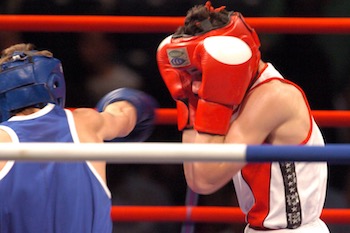 The XXXI Olympiad officially opened in Rio de Janeiro, Brazil last week. The Olympic Games will draw the attention of the world under a banner of honest competition and camaraderie. However, many have accused the International Olympic Committee (IOC) and the United States Olympic Committee (USOC) of conduct not in keeping with the open spirit of the Olympic Games.
The XXXI Olympiad officially opened in Rio de Janeiro, Brazil last week. The Olympic Games will draw the attention of the world under a banner of honest competition and camaraderie. However, many have accused the International Olympic Committee (IOC) and the United States Olympic Committee (USOC) of conduct not in keeping with the open spirit of the Olympic Games.
In the run-up to the Olympics, companies have reported receiving cease and desist letters from the USOC. These letters claim that use of the USOC’s trademarks in social media posts infringe on the USOC’s federal rights. For example, Oiselle, a women’s apparel company based in Seattle, Washington, received a cease and desist letter after adding “She’s going to Rio!” and#RoadtoRio in an Instagram post when Kate Grace, one of Oiselle’s sponsored athletes, qualified for the 800 meter event.
The aggressive action by the USOC has garnered significant media coverage, including a debate over whether the USOC’s actions are not only advisable from a public relations standpoint but permissible under the law.
The USOC enjoys broad powers granted to it directly by the Government through the Ted Stevens Olympic and Amateur Sports Act of 1998. The Act grants the USOC exclusive rights over many Olympic Games-related words and logos, specifically “Olympic”, “Olympiad”, “Citius Altius Fortius”, “Paralympic”, “Paralympiad”, “Pan-American”, “America Espirito Sport Fraternite”, or any combination of those words. The Act also allows the USOC to license its marks to sponsors and file civil action against any party using its marks without authorization.
Under its power to file civil action against infringement, the Act broadens the available underlying intellectual property for such an action from the enumerated words and symbols to “any trademark, trade name, sign, symbol, or insignia falsely representing association with, or authorization by” the IOC or USOC. Furthermore, any “use[] for the purpose of trade, to induce the sale of any goods or services, or to promote any theatrical exhibition, athletic performance, or competition” is actionable.
The USOC makes use of this broad grant by diligently filing for federal trademark protection. The USOC maintains a large portfolio of marks including, GO FOR THE GOLD, LET THE GAMES BEGIN, TEAM USA, RIO 2016, and ROAD TO RIO.
Appreciating the global interest in the Games, the USOC has issued guidelines for the “proper” use of its trademarks.
Under its general policy, the USOC advises that it has the right to file a lawsuit “against any entity using USOC trademarks, imagery or terminology for commercial purposes.” Under the “Commercial” subsection, the USOC takes a broader tack: “Any use of USOC trademarks by businesses or other commercial entities is prohibited without the express consent of the USOC. The USOC generally reserves the use of USOC trademarks for official Olympic sponsors, suppliers and licensees.”
The final line of this policy reveals the USOC’s motivation for aggressively policing of any claimed infringement, namely the lucrative sponsorships and licensing deals it incurs. This revenue stream is second only to the billions of dollars it earns for its broadcast rights, and brought in between $80 and $100 million each year in the period between 2012 and 2015. By taking an aggressive posture toward use of its marks, the USOC is protecting its second most valuable revenue stream. The USOC justifies its desire for increased revenue by noting that it receives no government funding to support its athletes.
It is undeniable that one of the underlying premises of trademark law is to protect brands from lost commercial power and revenue due to infringement. There is no doubt that the USOC has not only the means but also the right to actively enforce its intellectual property against genuine infringement. However, it is questionable as to whether this recent, broad stream of activity is valid under the law.
The USOC’s stated position that any use of its marks by a business or commercial entity is infringing likely overreaches its rights.
Brands often reference the “exclusive rights” granted to them by federal trademark registrations, but those rights are only exclusive in a commercial forum. Even trademark law allows for unauthorized use under of a third party’s trademarks in a fair use scheme, whether statutory or nominative.
The USOC appears to understand that there is a valid and protected news function that can make use of a registered trademark without causing harm to the rights holder. The USOC has carved out exceptions for when its marks are used to “provide context to an article, story, or image being published, broadcast or posted online for news-related purposes by a media company.” However, the guidelines emphasize that this exception is limited to media companies, not commercial entities “whose primary purpose is the sale of goods or services unrelated to disseminating the news…under the pretext of editorial content.”
Further, the USOC specifically “encourages individuals, news media outlets, and official TeamUSA sponsors to post” about the Olympic Games on social media. However, that grant is not extended to “other commercial entities” posting “on their corporate social media accounts.” According to ESPN, the USOC’s chief marketing officer, Lisa Baird, doubled-down on this position stating, “Commercial entities may not post about the Trials or Games on their corporate social media accounts.”
The USOC has staked the position that Oiselle’s social media accounts cannot reference the Games, but its founder, Sally Bergeson, is free to add #RoadtoRio to her posts on her personal social media accounts. Its argument that a commercial entity’s comment on a truly newsworthy event is per se disallowed or infringing is likely an overly broad attempt at protecting its lucrative sponsorship deals.
The USOC’s protectionist motivation is in full display in its relaxation of its infamous Rule 40, which previously prohibited non-official sponsors and athletes from mentioning their relationship for a month in advance of the Olympic Games. The USOC’s solution was to allow non-official sponsors of the Olympics to run ads during the Games as long as the ad campaigns began in March – some five months before the start of the Games – and ran through the competition.
While the relaxation of the rule allows for brands that cannot afford to officially sponsor the Olympics to gain some recognition of the investments they have made in Olympic athletes years-long quest to reach the podium, the scheme favors wealthy brands that can bear a sustained advertising campaign that features athletes certain to make the Games. Smaller companies and underdog athletes are not afforded the same return on investment. The USOC appears to be using its trademarks as the grounds to ensure that non-official sponsors do not trade the Games.
In addition to the general trademark infringement discussion, the use of the USOC’s trademarks in hashtags rather than in standard copy presents another legal question. The law surrounding the use of trademarks as hashtags is developing, with courts on opposite coasts viewing the matter differently.
In Eksouzian v. Albanese, a California court held that the plaintiff was not in violation of a settlement agreement that barred the plaintiff from using “cloud” and “penz” as a unitary mark when it used “#cloudpenz” in social media posts. Although the defendant owned a federal registration for CLOUD PENZ in connection with identical goods, the court found for the plaintiffs, noting hashtags are “merely a functional tool to direct the location of Plaintiffs’ promotion so that it is viewed by a group of consumers, not an actual trademark.”
In Public Impact, LLC v. Boston Consulting Group, Inc., a court in Massachusetts ruled differently on a similar fact pattern. In that case, Boston Consulting Group was enjoined from using “#publicimpact” in social media or other commercial activities because of the similarity of services in connection with Public Impact’s PUBLIC IMPACT federal trademark.
As a matter of comparison, the USPTO treats applications for trademarks featuring hashtags as though the application was applied for without the hashtag. In effect, the USPTO has made the determination that the hashtag does not add a distinctive element to a potential trademark.
Ultimately, the USOC’s clampdown of trademark infringement – whether in copy or in a hashtag on social media – is rooted in avoiding confusion regarding a false affiliation with the Olympics. When the USOC targets non-official sponsors of athletes and similar brands for using its marks in posts that are akin to advertisements, the USOC is on its strongest legal footing. However, when the USOC reaches outside the realm of possible confusion to stop a company from posting any Olympic content (e.g., event results), particularly without relation to its own product, the USOC is likely operating on shaky ground. The Olympics are an inherently newsworthy event. Barring companies from commenting on the Games, particularly in non-commercial ways, is likely an overreach of the USOC’s authority under even its own broad powers.

![[IPWatchdog Logo]](https://ipwatchdog.com/wp-content/themes/IPWatchdog%20-%202023/assets/images/temp/logo-small@2x.png)

![[Advertisement]](https://ipwatchdog.com/wp-content/uploads/2024/04/Patent-Litigation-Masters-2024-sidebar-early-bird-ends-Apr-21-last-chance-700x500-1.jpg)

![[Advertisement]](https://ipwatchdog.com/wp-content/uploads/2021/12/WEBINAR-336-x-280-px.png)
![[Advertisement]](https://ipwatchdog.com/wp-content/uploads/2021/12/2021-Patent-Practice-on-Demand-recorded-Feb-2021-336-x-280.jpg)
![[Advertisement]](https://ipwatchdog.com/wp-content/uploads/2021/12/Ad-4-The-Invent-Patent-System™.png)







Join the Discussion
No comments yet.